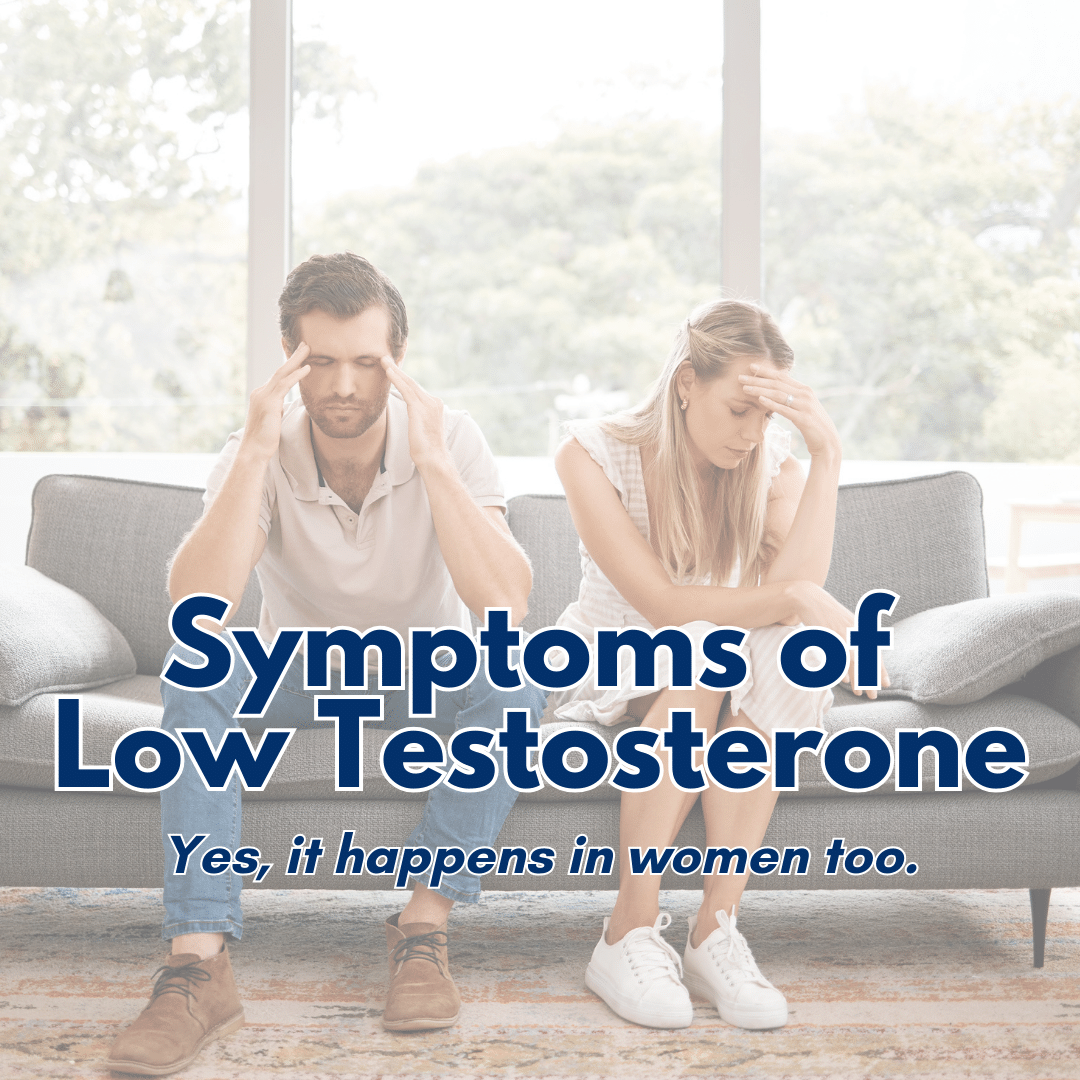Testosterone is an essential male AND female hormone responsible for various physiological functions such as muscle growth, sexual function, bone density, and even cognitive function. Find out if you are showing signs of low testosterone.

What Are The Symptoms Of Low Testosterone?
Signs To Look Out For
Testosterone is an essential male AND female hormone responsible for various physiological functions such as muscle growth, sexual function, bone density, and even cognitive function. However, as men AND women age, their body's production of testosterone decreases, leading to a condition known as low testosterone.
Low testosterone affects millions of people worldwide, and it's essential to recognize its symptoms early enough for proper treatment. In this article, we will discuss the main symptoms to look out for if you suspect that you may have low testosterone.
Low Testosterone Symptoms in Men

- Decreased sex drive (libido) and difficulty maintaining an erection
- Low energy levels, fatigue, and decreased physical strength
- Changes in mood, such as depression or irritability
- Difficulty sleeping or insomnia
- Loss of muscle mass and a decrease in muscle tone
- An increase in body fat even with no change in diet or exercise
- Decreased bone density and increased risk of fractures
- Hot flashes or night sweats, even in younger men
Low Testosterone Symptoms in Women

- Low sex drive (libido)
- Thinning hair and loss of scalp hair
- Mood swings, depression, and anxiety
- Decrease in muscle mass and changes to body composition
- Difficulty sleeping
- Hot flashes and night sweats
- Decreased bone density, leading to a higher risk of fractures
Let's dive into some of these symptoms in more detail.
Reduced Sex Drive

One of the most common symptoms of low testosterone is a significant reduction in sex drive or libido. Testosterone plays a vital role in the male sex drive, and low levels of the hormone can cause a decrease in sexual desire or even erectile dysfunction. Low testosterone levels can also reduce the frequency of morning erections, which are an indication of hormonal balance in males.
Fatigue and Low Energy Levels

If you feel tired all the time, despite getting enough sleep, it could be a sign of low testosterone. The hormone plays a significant role in energy levels by stimulating the production of red blood cells in the body. Low testosterone can lead to a reduction in red blood cell production, causing fatigue and a lack of energy.
Decreased Muscle and Bone Mass

Testosterone is essential for maintaining muscle mass and bone density in men. As men age and their testosterone levels decrease, they may notice a significant loss of muscle mass and reduced bone density, leading to an increased risk of fractures and osteoporosis.
Mood Changes

Low testosterone levels can also affect emotional wellbeing and cause mood changes such as depression, irritability, and poor concentration. Testosterone regulates mood by increasing serotonin levels, the hormone responsible for happiness and wellbeing.
Difficulty Sleeping
Testosterone plays an important role in sleep regulation, and low levels of the hormone can lead to insomnia or difficulty sleeping. Testosterone helps induce a deep sleep state necessary for physical and mental recovery. Low testosterone can also cause hot flashes or night sweats, even in younger men.
Decreased Hair Growth
Hair growth in men is closely linked to testosterone levels, and low levels of the hormone can cause a decline in facial and body hair growth. Some men may also notice thinning hair or baldness, especially in the crown area of the head.
Decreased Bone Density
Low testosterone can also cause an increase in bone fragility, as the hormone is essential for healthy bones. Low testosterone levels can lead to decreased bone mineral density and an increased risk of fractures.
If you are experiencing any of the above symptoms, it is important to speak with your doctor or healthcare provider. Blood tests can help determine if your testosterone levels are low, and the proper treatment plan can be implemented to help you get your testosterone levels back on track.
Low testosterone is a common condition, but that doesn't mean that it should be ignored or left untreated. If you suspect that your symptoms may be due to low testosterone, speak with your doctor today. Regen Wellness is a certified Evexias hormone practitioner and offer thorough and effective solutions to hormone balancing. Low testosterone treatment options are available, and the sooner you start managing the condition, the better off you will be!
Conclusion
Low testosterone levels can significantly impact a man's quality of life, affecting everything from sex drive and energy levels to overall emotional wellbeing. If you're experiencing any of the symptoms discussed in this blog post, it's essential to speak with your doctor about getting your testosterone levels checked. Fortunately, low testosterone is treatable, and hormone replacement therapy can help to restore normal levels of the hormone and improve overall health and wellbeing. Don't suffer in silence; speak up about your concerns and get the help you need.
